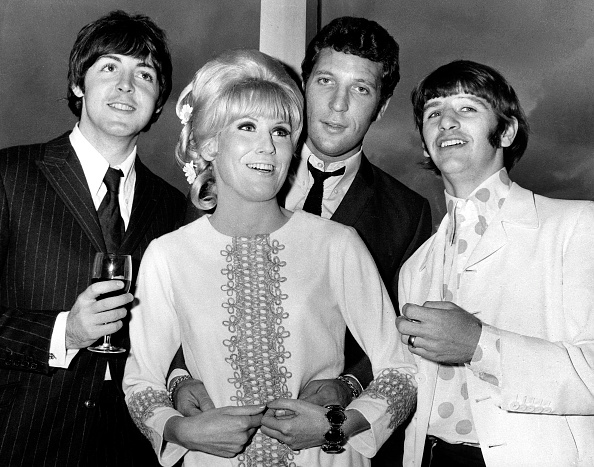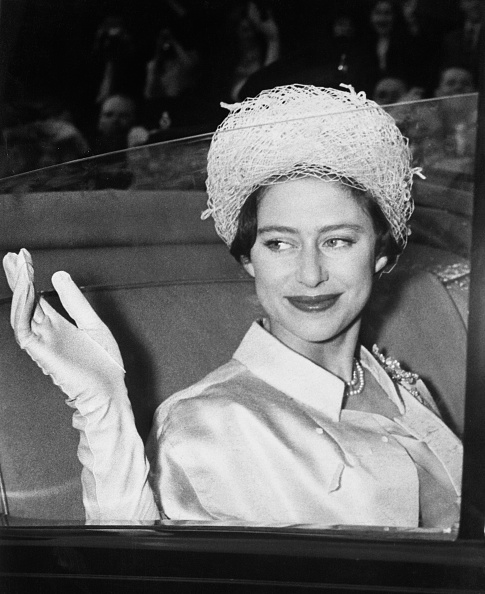It's the 85th anniversary of the birth of Dusty Springfield, daughter of Irish immigrants to London. MAL ROGERS looks back at a life and career which was as stratospheric as it was chaotic
 SUPERSTARS TOGETHER Paul McCartney, Dusty, Tom Jones, Ringo Starr (Getty Images)
SUPERSTARS TOGETHER Paul McCartney, Dusty, Tom Jones, Ringo Starr (Getty Images)SHE was one of the greatest female singers these islands have ever produced, across any genre from classical to folk. Born in London to Irish immigrants, Mary Bernadette O’Brien became a superstar called Dusty Springfield, and for a time in the 1960s was one of the most famous celebrities worldwide.
Her ethereal, almost eerie singing voice had a heart-searing wistfulness. Dusty put this down to her heritage: “There is a sadness there in my voice. I was born with it. Sort of melancholy. Comes with being Irish-Scottish. Melancholy and mad at the same time,” she said. Her friend Elton John agreed: "I'm biased but I just think she was the greatest white singer there has ever been.”
Influenced by a mix of American styles, from black soul music (her favourite) to country, folk and pop, Dusty sang with a power and attitude that set her apart from all British or Irish singers of the time and most American performers as well.
She introduced a smoky intimacy to some songs, and inflected other with a country twang. Dusty had image as well — lavish blonde bouffant, extraordinary long fake eyelashes, evening gowns that weighed a ton, and mascara that appeared to weigh not much less.
Her mother, who was born in Dublin but grew up in Tralee, enlisted Mary O’Brien in St Anne's Convent School, Northfields, a traditional all-girl school in England. Her tom-boyishness led to her nickname Dusty.
Her parents were music-loving Catholics; her father Gerard, of Scottish and Irish heritage, was a frustrated concert pianist and her mother, who was an alcoholic, was a dancer. It was not a happy household, but the O’Brien parents inveighed in their two children a deep appreciation of music that added depth and sophistication to both of their subsequent careers.
The wild nature of her mother probably left its mark on Dusty more than on her brother Dionysius Patrick 'Dion' O'Brien. In the authoritative biography Dusty: An Intimate Portrait of a Musical Legend, Karen Bartlett writes: “Dusty remembered her mother carefully making a trifle, and then smoothing the top with a spoon, smoothing it and smoothing it, until suddenly she started hitting it so hard it flew out of the basin and splattered all over the walls. ‘That way you’ll get it quicker,’ she angrily told her daughter.”
It was at times a chaotic upbringing. The wrong remark at the dinner table could lead to a bowl of potatoes flying past someone’s ear and full-scale food fights often ensued.
Abuse by her father has also been hinted at, although never specifically expressed; he was certainly known to have had a violent temper.
Despite this background, when her mother died in 1974, Dusty slumped into a serious depression and made the first in a series of suicide attempts.
 (L-R) Tina Turner, Ike Turner and Dusty Springfield performing the song 'Land Of A Thousand Dances' on music programme Ready Steady Go! at Television House in London, circa October 1966. (Photo by TV Times/TV Times via Getty Images)
(L-R) Tina Turner, Ike Turner and Dusty Springfield performing the song 'Land Of A Thousand Dances' on music programme Ready Steady Go! at Television House in London, circa October 1966. (Photo by TV Times/TV Times via Getty Images)The Springfields followed by a solo career
ALONG with her brother Dion and a friend called Tim Field, Dusty formed pop-folk band The Springfields. They had a string of hits, but before long Dusty decided to go solo. With her haunting vocal ability, and her stage presence, she went on to carve out a fabulously successful career, but one that had many twists and turns.
Dusty was kicked out of South Africa in 1965 for refusing to sing in front of a segregated audience, she championed African American music in Britian, and fought for dozens of other causes while embracing the so-called Swinging Sixties — the while struggling with her own demons. She came out as gay in 1972, and enjoyed — or perhaps endured — tempestuous relationships with her lesbian lovers. She may also have had an affair with Princess Margaret.
According to Karen Bartlett, she was plagued by raging paranoia about her looks and voice. On one occasion Dusty emerged from the kitchen of her house with a broken cup. “If you want to kill yourself,” she screamed at her lover Teda Bracci, “this is how you do it.” She slashed her own wrist then attacked Teda. she responded by hitting her repeatedly around the head with a boot.
This was one of many fights — including fist-fights — Duty had with her lovers.
DUSTY Springfield became an international pop star in 1964 with I Only Want to Be With You, followed by Wishin' and Hopin' (1964), and The Look of Love (1967), both written by Burt Bacharach and Hal David, the team that supplied Dionne Warwick with most of her early hits.
Dusty’s recording of Carole King’s I Just Don’t Know What to With Myself, brought tears to the eyes of the composer when she first heard it. The sheer emotional impact of Dusty’s interpretation moved King in a way that few other performers of her material did. As Elton John said: “Every song she sang, she claimed as her own." This came, undoubtedly, from her genuine musicality.
In the late 1960s Dusty fronted four seasons of her own Dusty TV show and guest-presented Ready Steady Go! introducing Motown artists such as Stevie Wonder and The Supremes to a British audience.
In 1966 – the year of You Don’t Have To Say You Love Me and Goin’ Back – Dusty had four hits in the UK, including I Don't Know What To Do With Myself, Son Of A Preacher Man, I Only Want To Be With You, The Look Of Love, Some Of Your Lovin' and You Don't Have To Say You Love Me.
According to Karen Bartlett’s book, she luxuriated in the wealth and glamour, holidaying in Hawaii and the Caribbean, often paying for her friends to go with her.
But her demons continued to haunt her. She suffered dreadful insecurities, with raging paranoia about her looks and voice that plagued her until her death. They made her unpredictable. On one occasion, driving her sports car late at night, Dusty knocked down 63-year-old Ida Metzger in Berkeley Square.
“I have no doubt that she was driving too fast,” the judge remarked after fining her £1,900. “|And I don’t suppose her ability to keep a proper look-out was enhanced by wearing dark glasses.”
Just two years later Dusty Springfield was admitted to a psychiatric ward at New York’s Bellevue Hospital after another suicide attempt.
In 1994 she was diagnosed with the cancer that would kill her five years later, at the age of 59.
Dusty spent most of her adult life in Britain and the US, dying in 1999. One of her lovers said that “Dusty wanted to be straight and she wanted to be a good Catholic and she wanted to be black”. She was none of these things, and her insecurities, exacerbated by alcohol, led to her destructive, downward spiral
She had her ashes scattered in the Atlantic off the Cliffs of Moher, in Co. Clare, her favourite place in Ireland. She asked her brother Dion to oversee the ceremony.
 PERSISTENT RUMOURS Princess Margaret (Getty Images)
PERSISTENT RUMOURS Princess Margaret (Getty Images)Dusty and the Princess
In 1979, Dusty performed a charity concert for a full house at the Royal Albert Hall, in the presence of Princess Margaret. The singer had by this time a large gay following. At the performance she announced, “It’s nice to see the royalty isn’t confined to the box”– a reference to the ‘queens’ among her fans.”
In Craig Brown’s biography of Princess Margaret, Ma’am Darling, the incident is gone into in some detail. Some reckon the princess blanked Dusty thereafter, others say she was totally unfazed by the quip.
But there is one other possibility often mentioned, and examined in Ma’am Darling: that Princess Margaret and Dusty were, in fact, ‘an item’. This is also alluded to in Karen Bartlett’s biography. She writes that after the show the Princess refused to speak to her about her performance. Shortly afterwards an official letter arrived asking Dusty to apologise for the joke. It was believed that Dusty sent the letter of apology.
The rumour of a lesbian relationship between the two was further fuelled by Princess Margaret’s specific request before the show that Dusty include the song Losing You, one that she no longer performed
Tom Springfield
Dionysius Patrick O’Brien was a significant figure in the pop and folk world.
After the Springfields broke up O’Brien went on to carve out a phenomenally successful career in the music business
When National Service was compulsory, he was conscripted into the British army for his National Service (1952–54), and was assigned to the Joint Services School for Linguists in Coulsdon, Surrey. He had to learn Russian, which led him to the Samovar Song Book, and a song from 1883 called Stenka Razin.
More than a decade later O’Brien used its melody as the basis of the song The Carnival is Over, a massive worldwide hit for the Australian band the Seekers.
He became record producer and songwriter for the Seekers writing many of their major hits including their first UK number one, I'll Never Find Another You as well as Georgy Girl (which he co-wrote with Jim Dale), A World of Our Own, and the million-selling The Carnival Is Over.
O’Brien also occasionally wrote theme music for television shows
He died in 2022 in London aged 88. His death preceded Judith Durham’s by just ten days.

